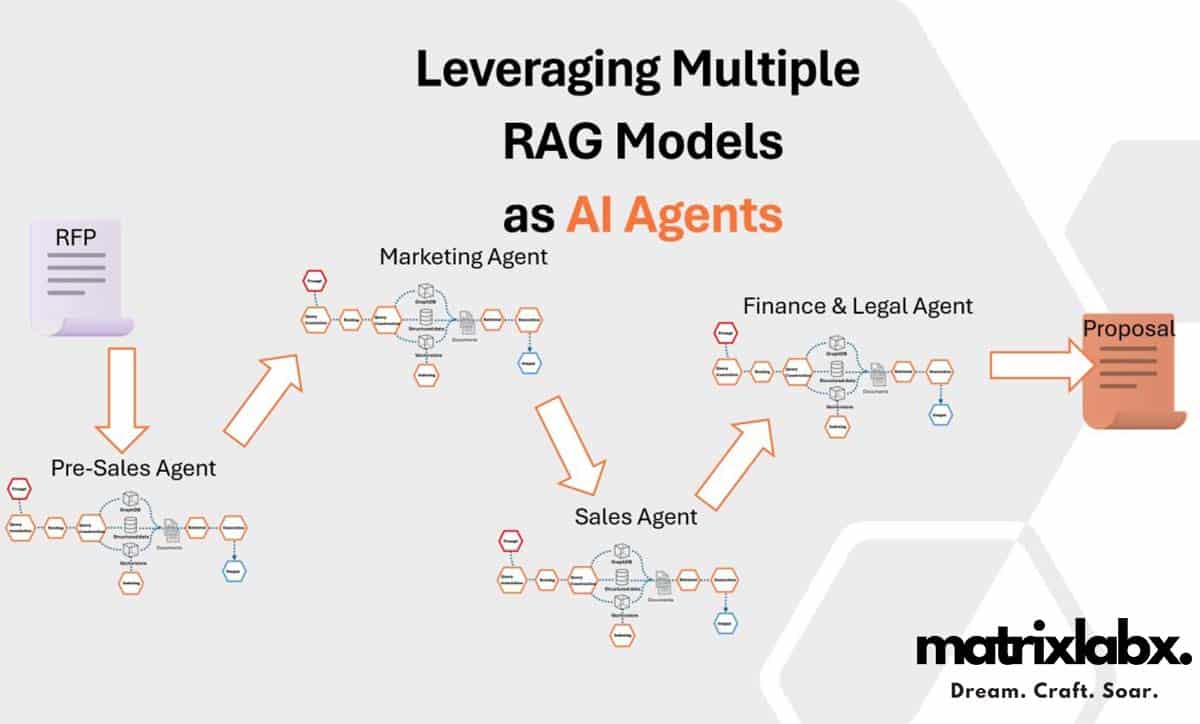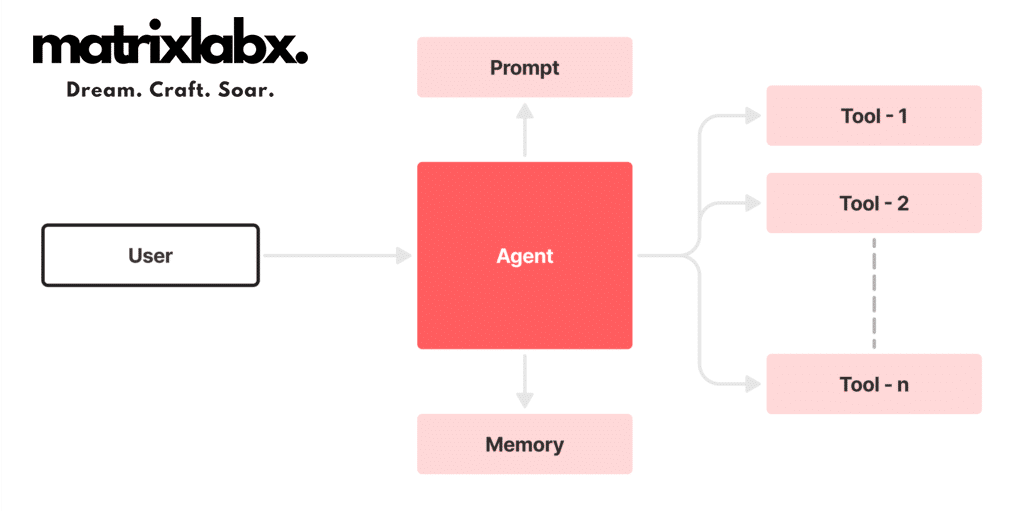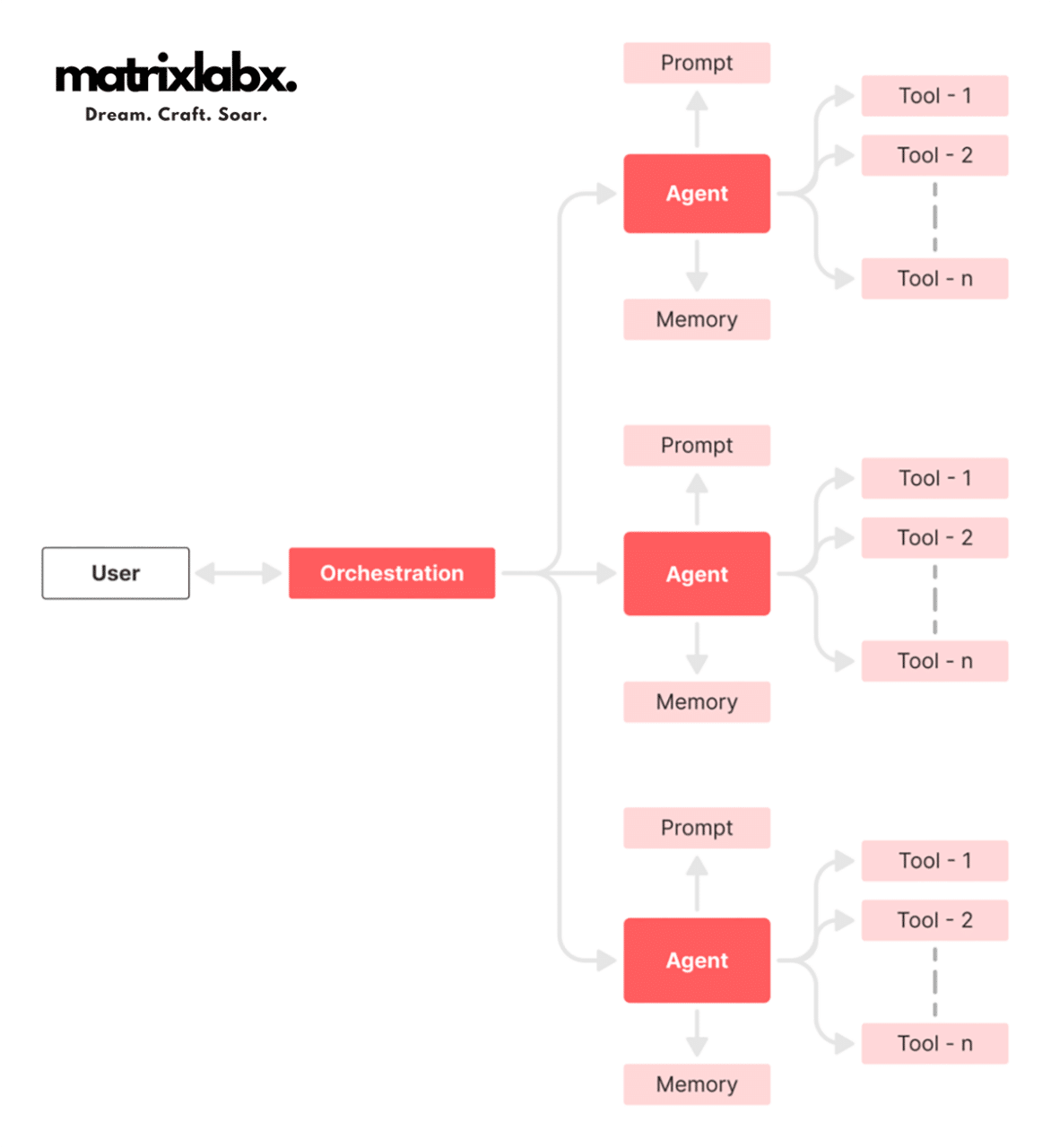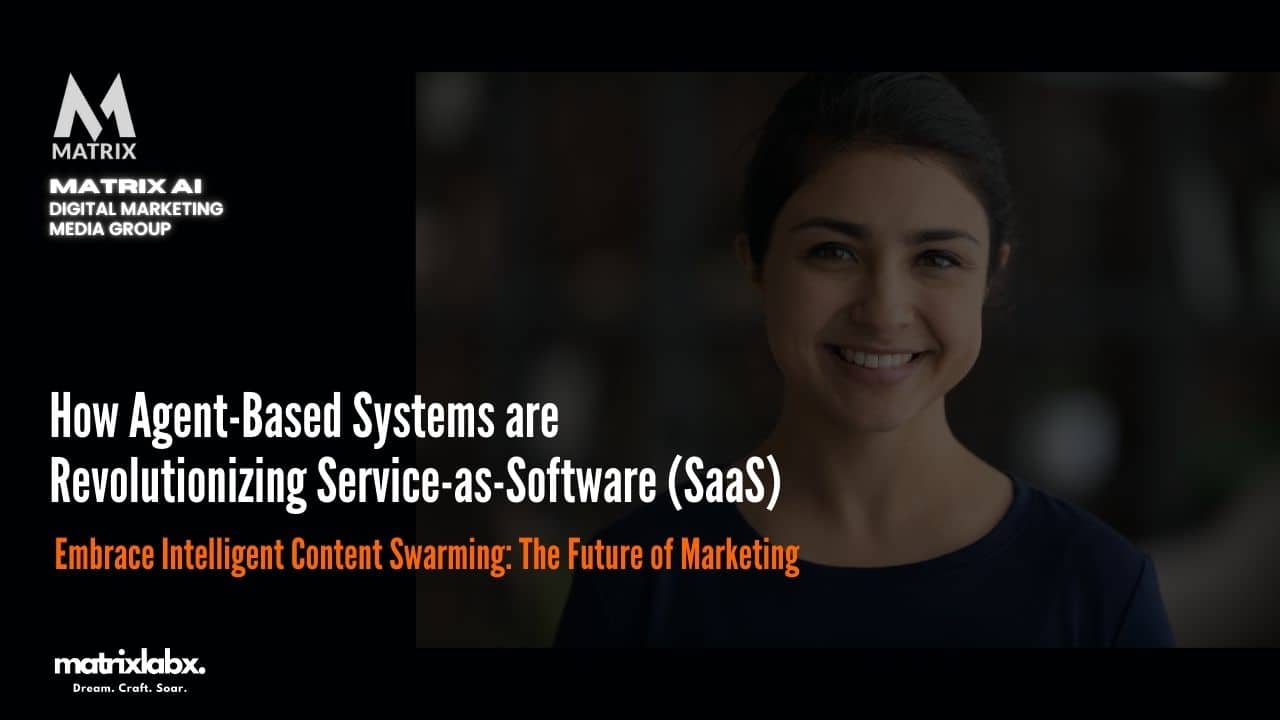How Agent-Based Systems are Revolutionizing Service-as-Software (SaaS)
Learn how Agent-Based Systems from MatrixLabX are Revolutionizing Service-as-Software (SaaS)
Have you ever been to a bustling airport where, instead of relying on human staff to manage every task—from checking baggage and directing passengers to guiding planes and managing security—each part of the airport is managed by intelligent, self-sufficient agents? These agents work independently, learning and adapting as they go, yet seamlessly coordinate to ensure passengers have a smooth and personalized experience.
This is how MatrixLabX’s agent-based systems, like AIProdPad, AIBrandPad, AIContentPad, and AIAdPad, revolutionize SaaS. Instead of needing constant oversight, these AI agents autonomously handle tasks like personalizing customer interactions, analyzing market trends, managing content, and optimizing ad placements.
Just as the airport agents continuously improve efficiency, respond instantly to unexpected changes, and tailor services to each traveler’s needs, MatrixLabX’s AI solutions enable SaaS to respond dynamically, delivering proactive, personalized, and efficient experiences for every user.
Introduction
In the ever-evolving world of Service-as-Software (SaaS), introducing intelligent, autonomous agent-based systems marks a transformative shift.
These systems, powered by artificial intelligence, are redefining the SaaS landscape by enabling advanced capabilities such as real-time decision-making, personalization, and adaptability.
Understanding the role of agent-based systems in SaaS is essential for chief marketing officers (CMOs) to harness digital transformation and fully deliver cutting-edge, customer-centric solutions. With agent-based systems, CMOs can unlock unprecedented competitive advantages, drive consistent innovation, and solidify customer loyalty.
Matrix Marketing Group, through its AI division MatrixLabX, is leading this charge with intelligent AI agentic systems like AIProdPad, AIBrandPad, AIContentPad, and AIAdPad.
These groundbreaking solutions reshape how marketing teams manage and optimize digital initiatives, making MatrixLabX a key player in the SaaS revolution.
1. Understanding Agent-Based Systems: What CMOs Need to Know

Agent-based systems are autonomous software entities, or “agents,” that operate independently, executing tasks based on learned patterns or preset rules.
Unlike traditional software, which relies on continuous human input, agent-based systems can adapt, learn, and self-organize.
These systems manage complex tasks autonomously, making real-time decisions based on multiple variables and providing a more flexible and intelligent approach to automation and personalization.
Key characteristics of agent-based systems include:
- Autonomy: Agents can perform tasks independently, reducing the need for constant oversight.
- Learning and Adaptability: Agents can learn and improve through interactions with data and users.
- Interconnectivity: Agents can communicate with each other, coordinating tasks and enhancing the system’s overall performance.
These features make agent-based systems particularly valuable for SaaS applications.
Industries ranging from finance to retail are leveraging these systems in customer service, predictive analytics, and operational automation, demonstrating the versatility and power of this technology.
We use domain-Specific AI Agents, a groundbreaking collaborative AI framework that revolutionizes marketing with advanced autonomous units of expertise.
Designed specifically for marketing departments, these specialized AI agents represent a significant leap forward. They combine AI Collaboration, Metacognition, Specialized Agents, and Neuro-Symbolic Reasoning to achieve next-level intelligence. This unique architecture allows AI to operate with enhanced self-awareness, specialized skill sets, and human-like reasoning, transforming how marketing teams achieve their goals.
2. The Intersection of Agent-Based Systems and SaaS
The fusion of agent-based systems with SaaS models opens up a new world of possibilities, transforming SaaS from tool-based offerings to proactive, solution-driven platforms.
MatrixLabX’s intelligent AI systems, such as AIProdPad, AIBrandPad, AIContentPad, and AIAdPad, exemplify how this integration can enhance user experiences and boost marketing impact.
Benefits of integrating agent-based functionality into SaaS platforms include:
- Real-Time Responsiveness: Agents make split-second decisions, allowing SaaS platforms to respond dynamically to user needs.
- Proactive Problem-Solving: By analyzing trends and predicting outcomes, agents can proactively address issues before they escalate.
- Adaptive Personalization: Agent-based systems continuously optimize the user experience based on unique preferences and behavioral data, driving deeper engagement and loyalty.
For SaaS providers, these benefits enhance customer satisfaction and empower marketing teams to react to real-time trends, making agent-based SaaS a powerful asset for CMOs aiming for agility and impact.
3. Key Benefits for CMOs: Leveraging Agent-Based Systems in SaaS

For CMOs, agent-based SaaS platforms provide unique advantages, including improved customer experiences, enhanced operational efficiency, and richer data insights.
- Improved Customer Experience: Agent-based systems make interactions more seamless and intuitive, meeting customer needs in real-time and creating a superior, more responsive journey.
- Increased Operational Efficiency: Autonomous agents can handle repetitive tasks, freeing up resources for strategic projects. MatrixLabX’s AIBrandPad, for example, automates key aspects of brand management by adjusting content based on real-time audience feedback, reducing the need for constant manual adjustments.
- Enhanced Data Utilization and Insights: Agents provide actionable insights for informed decision-making through real-time analytics and predictive intelligence. AIProdPad, for example, compiles and analyzes market data, helping CMOs anticipate customer needs and craft effective marketing strategies.
- Agility and Scalability: Agent-based systems scale naturally and adapt to market changes or shifts in consumer demand, offering CMOs the flexibility to adjust their efforts based on real-time data.
4. Practical Applications of Agent-Based SaaS for CMOs
Agent-based systems offer versatile applications for CMOs, from streamlining customer support to enhancing personalization, forecasting market trends, and optimizing sales.
Agent-based SaaS offers practical applications for CMOs, including streamlining customer support with chatbots, personalizing marketing campaigns, predicting market trends, and optimizing sales through lead qualification and nurturing.
By leveraging data-driven insights, agents can tailor marketing messages to individual customer preferences, increasing relevance and engagement.
- Customer Support and Chatbots: Agent-based chatbots elevate customer service by providing instant, context-aware responses. AIAdPad, developed by MatrixLabX, optimizes real-time ad responses, creating a seamless customer experience across multiple channels.
- Personalized Marketing Campaigns: By leveraging data-driven insights, agents can tailor marketing messages to individual customer preferences, increasing relevance and engagement.
- Predictive Analytics and Market Forecasting: Agent-based systems analyze customer behaviors to anticipate needs and predict trends. AIContentPad applies these insights to help CMOs craft proactive marketing strategies that align with market demands.
- Sales and Lead Generation: With agents managing tasks like lead qualification and nurturing, sales workflows are streamlined and optimized, allowing CMOs to concentrate on long-term growth strategies.
5. Challenges and Considerations for CMOs Adopting Agent-Based SaaS
Experience and expertise in artificial intelligence (AI), particularly in applying it to various industries, are rare and highly sought-after skills. This scarcity stems from the intersection of technical and industry-specific knowledge that AI professionals need to master—a challenging feat that few achieve.
- Multidisciplinary Complexity AI isn’t just about coding or machine learning algorithms. It requires a blend of data science, computer science, and, often, domain-specific knowledge. For example, using AI in healthcare requires a deep understanding of AI models and knowledge of healthcare regulations, patient data privacy, and medical workflows. In finance, AI professionals need expertise in fraud detection, risk assessment, and the complexities of financial markets. This interdisciplinary depth makes AI applications effective and hard to replicate without specific training and experience.
- Evolving and Specialized Skill Set The AI field is one of the fastest-evolving areas in technology. From the rise of neural networks and deep learning to advancements in natural language processing and reinforcement learning, staying up-to-date requires continuous learning. Professionals with significant experience in AI have often spent years honing their skills, navigating emerging technologies, and experimenting with applications that drive real-world results. Finding someone with historical experience and awareness of cutting-edge AI developments is rare, as many professionals are still building foundational knowledge or narrowly focused on one specific branch.
- Industry Knowledge as a Critical Differentiator Applying AI effectively requires technical ability and an understanding of how an industry operates and what drives its value. For example, someone implementing AI for a manufacturing firm must know about supply chains, production cycles, and logistics. Without this context, it’s difficult to create models that capture the nuances of industry-specific problems, leading to solutions that might be technically sound but impractical. AI professionals who bridge this gap—combining technical proficiency with industry insight—are invaluable.
- Strategic Vision and Ethical Implications AI leaders need a strong strategic mindset to guide organizations through AI adoption and scaling beyond technical skills and industry knowledge. They must think beyond immediate applications, considering the long-term impact of AI on processes, employee roles, and ethical implications, such as data privacy and bias. Only some professionals possess this holistic vision, further narrowing the talent pool.
The combination of these requirements makes experienced AI professionals who can apply their expertise to industry-specific challenges exceptionally valuable and hard to find.
As industries continue to recognize AI’s transformative potential, the demand for such hybrid talent is only set to grow, making those who possess it rare and essential for organizations aiming to lead in their fields.
While agent-based SaaS holds vast potential, it also presents challenges that CMOs must navigate carefully.
- Data Security and Privacy: Agents’ autonomous nature raises concerns about data privacy, making compliance with data protection regulations a top priority.
- Integration with Legacy Systems: Existing systems may not be immediately compatible with advanced agent-based platforms, posing technical challenges during integration.
- Managing Customer Expectations: Maintaining customer transparency is essential, especially with AI-driven interactions that may be perceived as impersonal or intrusive if managed poorly.
- Investment and ROI: Although agent-based systems offer significant value, the initial investment can be substantial. CMOs need to track ROI through well-defined KPIs to assess the effectiveness of these tools.
MatrixLabX addresses these challenges by ensuring its agentic solutions, like AIProdPad and AIBrandPad, are secure, scalable, and customer-centric. This provides CMOs with a viable path to successful implementation and ROI measurement.
6. Strategic Steps for CMOs to Implement Agent-Based SaaS

Implementing agent-based SaaS systems offers CMOs a powerful way to enhance customer experience, improve agility, and streamline operations.
To get started, CMOs should ensure alignment with the company’s goals, collaborating with other executives to define specific objectives like enhancing personalization, streamlining processes, or improving customer service.
Success depends on establishing clear Key Performance Indicators (KPIs) that reflect short-term and long-term impacts, such as customer engagement, operational efficiency, and cost savings. By setting these benchmarks, CMOs can better gauge the system’s effectiveness.
A successful rollout also requires a cross-functional team to support seamless integration. CMOs should work with IT, customer service, data science, and marketing departments, starting with a focused pilot project within a specific area or customer segment.
This allows for testing, gathering feedback, and making necessary adjustments before scaling.
Empowering Intelligent Marketing with Multi-Agent RAG Systems
A New Era of AI with Matrix Marketing Group and MatrixLabX
Matrix Marketing Group, in partnership with MatrixLabX, is redefining the future of marketing through next-generation AI capabilities powered by Multi-Agent RAG Systems. This revolutionary approach elevates traditional AI, providing brands with an adaptable, deeply intelligent system for solving marketing challenges and seizing opportunities. Learn more.
Post-pilot optimization is crucial—CMOs should continually analyze performance data, iterating on agent algorithms and user experience to ensure the system remains relevant and effective as business needs evolve.
In parallel, prioritizing data security and regulatory compliance is essential, as agent-based systems often handle sensitive customer information.
CMOs must work closely with IT and legal teams to safeguard customer data and build trust. Additionally, training teams on interacting with AI agents empowers employees to work in partnership with these digital tools, enhancing collaboration rather than replacing human touchpoints.
Once proven successful, the agent-based SaaS can be gradually scaled. CMOs maintain ongoing feedback loops to refine and evolve the system in response to changing customer expectations and industry advancements.
Through this strategic, phased approach, CMOs can maximize the value of agent-based SaaS, positioning the organization for long-term success and competitive advantage.
CMOs should follow a strategic, step-by-step approach to maximize the benefits of agent-based SaaS.
- Aligning with Organizational Goals: Agent-based SaaS initiatives must align with broader business objectives. MatrixLabX’s platforms, like AIBrandPad, seamlessly integrate with organizational goals, supporting brand consistency and enhanced customer engagement.
- Building Cross-Functional Teams: Collaboration between IT, product development, and customer service ensures smooth implementation and cohesive strategy.
- Testing and Iteration: Running pilot programs allows teams to refine agent behaviors, enhancing their effectiveness before a full-scale rollout.
- Measuring Success: CMOs can track success with KPIs like customer engagement, operational efficiency, and revenue growth. AIProdPad, for instance, provides detailed analytics, offering CMOs insight into areas for optimization and further investment.
7. The Future of Agent-Based SaaS: Trends and Predictions

The future of agent-based SaaS is promising, with technological advancements likely to enhance autonomy and improve customer engagement.
Emerging trends include:
- Greater Autonomy in Decision-Making: Agents will evolve to make increasingly complex decisions, reducing the need for human oversight.
- Enhanced Customer Engagement: As agents grow more sophisticated, they will provide deeper insights into customer behavior, enabling brands to offer more personalized, relevant experiences.
- Expanding Market Applications: Agent-based SaaS platforms will likely expand into new industries, bringing intelligent automation and improved customer interactions to a broader range of applications.
MatrixLabX’s AI solutions are at the forefront of these trends, and they are continuously developing tools to meet future demands. As this technology progresses, platforms like AIProdPad, AIContentPad, and AIBrandPad will enable CMOs to deliver standout customer experiences while staying ahead of the competition.
Conclusion
Agent-based systems represent a significant advancement in SaaS, transforming how companies handle customer experiences, data utilization, and operational efficiency. For CMOs, integrating intelligent agents offers a powerful tool to drive innovation, meet evolving consumer expectations, and stay competitive. Matrix Marketing Group and MatrixLabX are paving the way with AI solutions like AIProdPad, AIBrandPad, AIContentPad, and AIAdPad, setting a new standard for intelligent SaaS.
Through careful planning and the strategic adoption of agent-based SaaS, CMOs can position their brands as leaders in digital transformation, delivering superior experiences and securing a competitive edge. As the SaaS landscape evolves, embracing agent-based systems will be critical for CMOs who aim to excel in a rapidly changing market.


